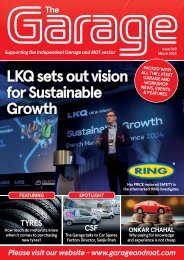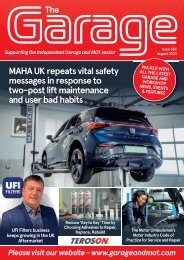The Garage 361
Create successful ePaper yourself
Turn your PDF publications into a flip-book with our unique Google optimized e-Paper software.
EV<br />
CHARGED UP:<br />
Why the UKs<br />
EV transition<br />
is in full swing<br />
By Mike Cafferky,<br />
Operations Director<br />
of OCU Evolution.<br />
<strong>The</strong> first “real” electric vehicle (EV) was<br />
introduced to roads in the US in 1888,<br />
meaning we’ve had over 100 years of<br />
automotive advancements to weigh up their<br />
potential as the natural successor to fossil<br />
fuel powered vehicles.<br />
Despite this, it’s only recently that<br />
demand for EVs to become the main form<br />
of transportation has intensified. This is due<br />
to a series of policies and commitments<br />
introduced by the Government, which have<br />
been designed to support the UK’s move to<br />
net zero by 2050.<br />
To meet this target, the UK needs a radical<br />
reduction in the burning of fossil fuels,<br />
phasing out some of the biggest emitters,<br />
petrol and diesel cars, and replacing them<br />
with cleaner, more sustainable electric<br />
vehicles (EVs).<br />
Businesses need to view the adoption<br />
and integration of EVs as an essential<br />
process and not something that is merely a<br />
consideration.<br />
<strong>The</strong> key benefit for transitioning is to<br />
improve a company’s sustainability and<br />
impact on the environment. Businesses<br />
operating fleets of EVs have lower emissions<br />
compared to those with petrol and<br />
diesel vehicles. Even counting electricity<br />
generation, the carbon emissions of an<br />
electric car are around 17-30% lower than<br />
driving a car with an internal combustion<br />
engine .<br />
Grants and financial incentives are<br />
available for small-medium sized businesses<br />
looking to switch to an EV fleet. <strong>The</strong><br />
Government’s Electric vehicle infrastructure<br />
(EVI) grant for staff and fleets provides SMEs<br />
with money off the cost of installing EV<br />
chargepoints and supporting infrastructure<br />
for their staff and fleet vehicles.<br />
EVs offer other benefits too, such<br />
as lower Benefit-in-Kind tax rates, 0%<br />
road tax until 2025 and exemptions<br />
from London Congestion Charges. VAT<br />
registered companies can also claim back<br />
50% of the VAT on vehicle payments or<br />
maintenance costs.<br />
With new vehicles powered by<br />
combustion engines set to be banned by<br />
2035 in the UK, businesses can benefit by<br />
investing and evolving their fleets now.<br />
Is range anxiety still a prominent issue<br />
with EVs?<br />
Almost all (99%) of car journeys in<br />
England are under 100 miles and most<br />
could be made by an EV without needing<br />
to recharge. This is simply because many<br />
EVs can now travel further than before.<br />
<strong>The</strong> average battery range for new vehicles<br />
launched in 2023 was almost 300 miles on<br />
a full charge, while vans such as the Ford<br />
E-Transit can do around 236 miles when<br />
fully charged.<br />
Despite this, there is still a level of<br />
anxiety among the public regarding existing<br />
electric vehicle infrastructure (EVI) –<br />
most notably the accessibility of charging<br />
points for long journeys. <strong>The</strong> Society of<br />
Motor Manufacturers and Traders (SMMT)<br />
reported in 2022 that, “as plug-in vehicle<br />
registrations surged, public charging<br />
infrastructure expansion has failed to keep<br />
pace. Plug-in cars on the road had grown<br />
a phenomenal 280.3% between 2019 and<br />
2021, but slow/fast public chargepoints<br />
grew by just 69.8% in the same period.”<br />
That’s why we’re addressing these<br />
concerns by providing a sensible, endto-end<br />
solution. OCU Evolution provides<br />
businesses with the complete EV<br />
package, from installing and connecting<br />
infrastructure through to providing<br />
charging units for cars, lorries and<br />
buses. We also support with the ongoing<br />
maintenance and commissioning of substations,<br />
solar panels and batteries.<br />
And the timing couldn’t be better. <strong>The</strong><br />
SMMT reported that Britain’s millionth<br />
battery electric car (BEV) hit the road in<br />
January 2024, and SMMT’s latest used car<br />
market figures for 2023 show that BEV<br />
uptake was up 90.9%, proving to us that<br />
there is potential for huge growth provided<br />
supply from the new market remains<br />
consistent.<br />
Is the current EV charging infrastructure<br />
prepared to cope with further EV<br />
adoption? If not, what needs to be done to<br />
remedy this?<br />
EV adoption will stall without a public<br />
network of chargers for drivers. People<br />
need access to chargepoints at home and<br />
at work, as well as for long-distances or<br />
those in need of a quick top-up.<br />
As of January 2024, 55,301 charging<br />
points have been installed across the UK<br />
, but the Government has said it wants to<br />
grow that number to 300,000 charging<br />
points by 2030. This highlights the big<br />
task ahead, and the need to expand the<br />
network and increase investment. Despite<br />
this, we want to contribute towards that<br />
momentum of getting those charges in the<br />
ground over the next six years. For us it’s<br />
about having the technicians and the right<br />
equipment in the right place to service<br />
businesses who want to build their charging<br />
capabilities. While the UK has a long road<br />
ahead, if we continue to collaborate and<br />
embrace technological advancements,<br />
we’ll be in a strong position to hit the zeroemission<br />
vehicle target.<br />
We know there is a huge opportunity<br />
to create a more sustainable and efficient<br />
transport system in the UK, but if the EVI<br />
and charging stations are not in place, it<br />
will be increasingly difficult to encourage<br />
businesses and members of the public to<br />
buy into this new norm. However, despite<br />
the challenges, we’ll be on hand to help<br />
businesses across the nation make a<br />
successful transition to a greener, cleaner<br />
future.<br />
24 THE GARAGE<br />
21 Feature EV.indd 4 27/03/2024 13:55

















